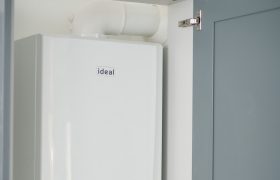Looking for tips to keep your home warm and cosy this winter, with its shorter days, snowy landscapes and seriously chilly temperatures? Our essential winter checklist is packed with ideas and information to help you prepare your property for the colder evenings ahead.
In this blog, we’ll share our top 10 tips for getting your home ready for winter, from insulating loft spaces and securing loose roof tiles to keeping your boiler in the best condition with a service. You’re sure to find some handy inspiration with Ideal Heating’s winter home tips.
Check Your Outdoor Lights
It doesn’t take long for afternoons and evenings to get much darker during winter, so making sure any outside lights are in good working order is a really important job. It’s a good idea to make sure you have a sturdy snow shovel too, which will help you clear a path for your path or driveway in case we see any winter storms.
Insulate Your Loft Space
We all know that heat always rises, so it makes sense that a poorly insulated loft is one of the biggest causes of heat loss in our homes. If your loft isn’t already insulated, it’s a great job to get out of the way before winter sets in. You may even be eligible for money-saving schemes such as the Energy Company Obligation — head to our blog on housing and energy grants to learn more.
Secure Any Loose Roof Tiles
If your loft is all ready for the winter cold, you still need to think about the state of your roof. General wear and tear, as well as slipped roof tiles, can lead to unsightly leaks and potentially cause structural damage to your home. If you’ve noticed any issues or have put off having repairs done, it’s definitely best to get this job done before the worst of the winter weather arrives.
Keep Emergency Supplies to Hand
Power cuts during winter can cause a lot of headaches if you’re not prepared for them. It’s a really good idea to ensure you have essential emergency supplies to hand such as a battery-powered torch and a radio that could help keep you up to date with local weather forecasts. Prepare a list of emergency numbers too, including dialling 105 to contact Power Cut 105.
Dig Out Your Winter Jumpers
Although we’ll all find ourselves having to reach for the thermostat at some point this winter, it’s always worth remembering to unpack your cosiest jumpers ready for the coldest days of the year. It’s a simple tip but it could save you more money than you think, with the Energy Saving Trust reporting that turning your room thermostat down by one degree can save £60 a year.
Bleed Your Radiators
If your radiator seems to be less efficient at heating up than it used to be, there may be air trapped in your central heating system. The answer to getting your home back to being as warm as comfortable as you need it to be is often as simple as bleeding your radiators. This is a fairly straightforward process and should get you feeling snug again in no time.
Make Sure Your Boiler is Serviced
It’s recommended that you have your boiler serviced at least once a year. That will keep it running safely and efficiently, as well as helping to protect your warranty. The good news is that many boiler manufacturers, like our team at Ideal Heating, will get in touch with you when your boiler’s service is due. It’s even easier than you might think to book a service online.
Draught-Proof Your Home
The last thing you want during winter is the cold weather managing to creep inside. According to the experts at Which, draught-proofing your windows and doors will not only keep the chill out, it could save you up to £20 in energy a year too. It’s a simple and effective way to keep your house warm and will cost around £200 if you find an expert to do the work for you.
Clean Out Your Guttering
If your guttering becomes blocked by leaves or other debris, you could end up with blockages during winter if there’s heavy rain or snow. This could potentially lead to leaks, standing water turning to ice or even your guttering becoming overloaded and falling out of alignment. If you do suspect a problem, it’s best to get it resolved as soon as possible.
Test Your Carbon Monoxide Alarm
It’s highly recommended that you keep a carbon monoxide alarm in your home if you have a fuel-burning fire, stove or boiler. If they haven’t been installed, ventilated or maintained properly, they could all potentially leak this dangerous and odourless gas. If you already have an alarm handy, don’t forget to test the battery regularly and keep it roughly 15cm from the ceiling.
You’ll find further advice on central heating, servicing and boiler care in our FAQs, as well as more in-depth guides on the Ideal Heating blog.




